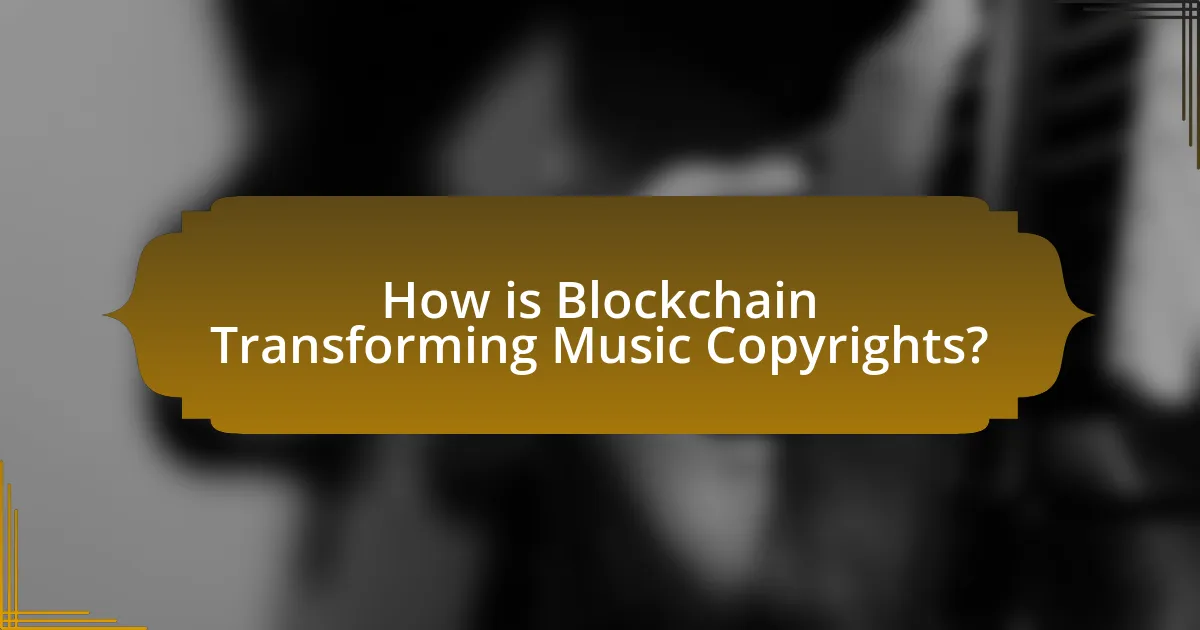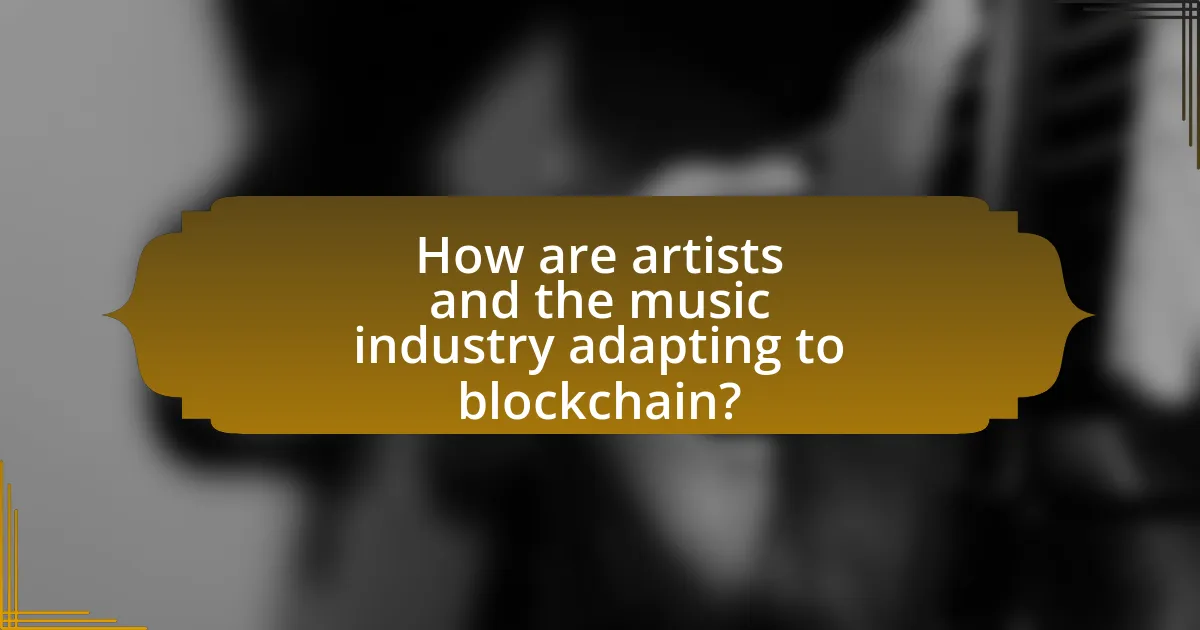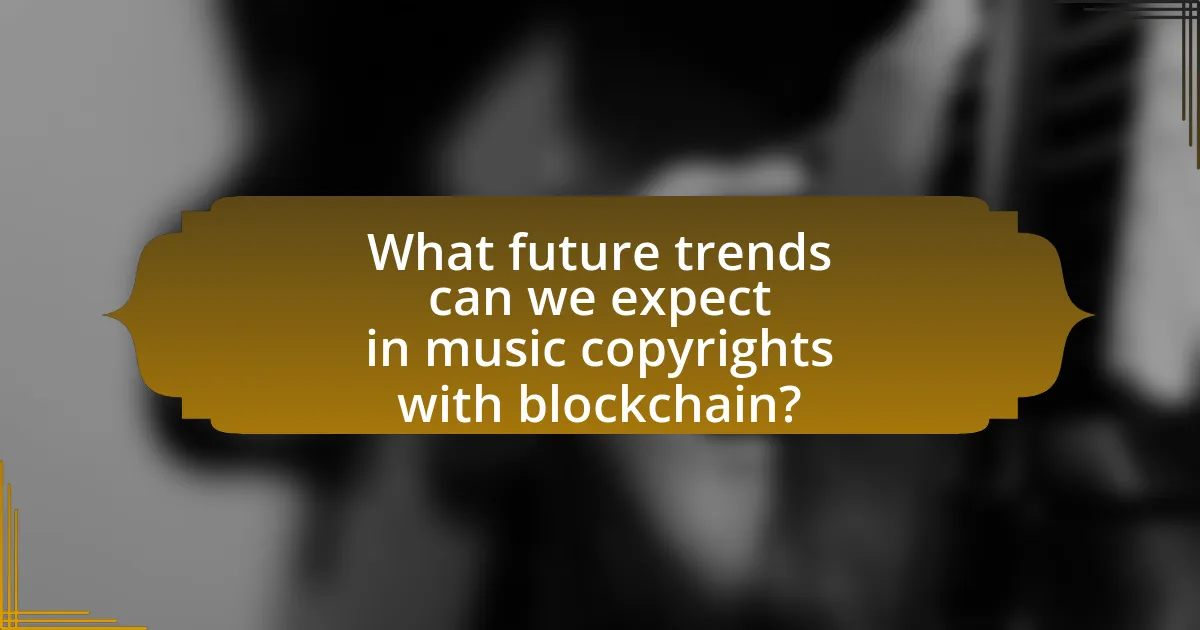Blockchain technology is revolutionizing music copyrights by providing a decentralized and transparent system for tracking ownership and usage rights. This article explores how blockchain enables artists to register their works, manage rights directly, and receive fair compensation through smart contracts, thereby eliminating intermediaries and reducing copyright infringement risks. It also addresses the challenges of traditional music copyright systems, such as complex licensing processes and inadequate compensation, while highlighting successful blockchain platforms like Audius and Ujo Music. Additionally, the article discusses the potential benefits of blockchain, including enhanced transparency, improved revenue distribution, and the future trends in music copyright management.

How is Blockchain Transforming Music Copyrights?
Blockchain is transforming music copyrights by providing a decentralized and transparent system for tracking ownership and usage rights. This technology enables artists to register their works on a blockchain, ensuring that their copyright information is immutable and easily accessible. For instance, platforms like Ujo Music and Myco use blockchain to allow musicians to manage their rights directly, eliminating intermediaries and reducing the risk of copyright infringement. Additionally, smart contracts on blockchain facilitate automatic royalty payments, ensuring that artists receive fair compensation in real-time whenever their music is used. This shift not only empowers creators but also enhances trust and efficiency in the music industry.
What are the key challenges in traditional music copyright systems?
The key challenges in traditional music copyright systems include difficulty in tracking ownership, complex licensing processes, and inadequate compensation for artists. Traditional systems often struggle to accurately identify and manage the rights of multiple stakeholders involved in a single piece of music, leading to disputes and confusion over ownership. Additionally, the licensing process can be cumbersome, requiring artists to navigate various intermediaries, which can delay payments and reduce overall earnings. According to a 2019 report by the International Confederation of Societies of Authors and Composers, only 12% of music creators feel they are fairly compensated for their work, highlighting the inadequacies in traditional copyright frameworks.
How do these challenges affect artists and creators?
Challenges in the music industry, such as copyright infringement and lack of fair compensation, significantly affect artists and creators by limiting their revenue and control over their work. These issues often lead to financial instability, as artists struggle to monetize their creations effectively. For instance, a study by the International Federation of the Phonographic Industry (IFPI) reported that only 12% of artists earn a living solely from music, highlighting the economic impact of these challenges. Additionally, the complexity of traditional copyright systems can result in artists losing rights to their work, further diminishing their creative autonomy and potential earnings.
What are the limitations of current copyright enforcement methods?
Current copyright enforcement methods face significant limitations, including difficulties in tracking and identifying infringers, high costs associated with litigation, and the slow pace of legal processes. These challenges hinder the ability of copyright holders to effectively protect their intellectual property. For instance, a report by the U.S. Copyright Office highlights that many copyright owners lack the resources to pursue legal action, resulting in widespread infringement going unaddressed. Additionally, the rise of digital platforms complicates enforcement, as content can be easily copied and distributed without proper attribution, making it challenging for rights holders to monitor usage.
What role does blockchain technology play in music copyright?
Blockchain technology plays a crucial role in music copyright by providing a decentralized and transparent system for tracking ownership and usage rights. This technology enables artists to register their works on a blockchain, creating an immutable record that verifies their ownership and the terms of use. For instance, platforms like Ujo Music utilize blockchain to ensure that artists receive fair compensation through smart contracts, which automatically distribute royalties based on predefined conditions. This approach addresses issues of piracy and unauthorized use, as every transaction is recorded and can be audited, thereby enhancing trust and accountability in the music industry.
How does blockchain ensure transparency in music rights management?
Blockchain ensures transparency in music rights management by providing a decentralized and immutable ledger that records all transactions related to music rights. This technology allows artists, producers, and other stakeholders to access real-time data about ownership and usage rights, reducing disputes and enhancing trust. Each transaction is time-stamped and linked to a unique digital identifier, ensuring that all parties can verify the authenticity and history of rights ownership. For instance, platforms like Ujo Music utilize blockchain to enable artists to manage their rights directly, ensuring that they receive fair compensation for their work without intermediaries. This level of transparency is supported by the inherent characteristics of blockchain, such as decentralization and cryptographic security, which collectively enhance accountability in the music industry.
What mechanisms does blockchain use to track music usage?
Blockchain uses decentralized ledgers, smart contracts, and cryptographic hashing to track music usage. Decentralized ledgers maintain a transparent and immutable record of all transactions related to music rights and usage, ensuring that all stakeholders can access the same information. Smart contracts automate royalty payments and licensing agreements, executing transactions when predefined conditions are met, which reduces administrative overhead and enhances efficiency. Cryptographic hashing secures data integrity, ensuring that any changes to music usage records are easily traceable and verifiable. These mechanisms collectively enhance transparency, reduce disputes, and streamline the management of music copyrights.
What are the potential benefits of using blockchain for music copyrights?
The potential benefits of using blockchain for music copyrights include enhanced transparency, improved royalty distribution, and increased security. Blockchain technology allows for a decentralized ledger that records all transactions related to music rights, ensuring that artists and rights holders can easily track their works and receive fair compensation. According to a study by the Berklee College of Music, blockchain can reduce the time it takes to process royalty payments from months to days, thereby streamlining the entire process. Additionally, the immutable nature of blockchain protects against unauthorized use and fraud, providing artists with greater control over their intellectual property.
How can blockchain improve revenue distribution for artists?
Blockchain can improve revenue distribution for artists by enabling direct transactions between creators and consumers, eliminating intermediaries. This technology allows artists to receive payments instantly and transparently through smart contracts, which automatically execute transactions based on predefined conditions. For instance, a study by the Berklee College of Music highlights that blockchain can reduce transaction costs and increase the speed of payments, ensuring that artists receive a larger share of the revenue generated from their work. Additionally, platforms like Audius utilize blockchain to provide artists with control over their content and earnings, further enhancing their financial benefits.
What impact does blockchain have on copyright infringement issues?
Blockchain significantly reduces copyright infringement issues by providing a transparent and immutable ledger for tracking ownership and usage rights of creative works. This technology enables artists to register their works on a decentralized platform, ensuring that their intellectual property is securely documented and easily verifiable. For instance, platforms like Ujo Music utilize blockchain to allow musicians to control their rights and receive direct payments, minimizing unauthorized use and piracy. Additionally, smart contracts automate royalty payments, ensuring that creators are compensated fairly and promptly, which further discourages infringement. The implementation of blockchain in copyright management has been shown to enhance accountability and traceability, thereby protecting artists’ rights more effectively than traditional systems.

How are artists and the music industry adapting to blockchain?
Artists and the music industry are adapting to blockchain by utilizing decentralized platforms for music distribution and rights management. This technology allows artists to directly control their intellectual property, ensuring they receive fair compensation for their work. For instance, platforms like Audius and Ujo Music enable artists to publish their music on the blockchain, eliminating intermediaries and reducing costs associated with traditional distribution methods. Additionally, smart contracts are being employed to automate royalty payments, ensuring transparency and timely compensation. A report by Deloitte highlights that blockchain can streamline the royalty distribution process, potentially saving the music industry billions in administrative costs.
What are some successful examples of blockchain in music?
Successful examples of blockchain in music include platforms like Audius, which allows artists to publish their music directly to fans while retaining control over their rights and earnings. Another example is Ujo Music, which uses blockchain to manage music rights and facilitate fair payments to artists. Additionally, Myco, a blockchain-based platform, enables musicians to tokenize their work, allowing for direct sales and royalties tracking. These platforms demonstrate how blockchain technology can enhance transparency, reduce intermediaries, and ensure artists receive fair compensation for their work.
How have artists leveraged blockchain for their music rights?
Artists have leveraged blockchain technology to secure and manage their music rights more effectively. By utilizing smart contracts, artists can automate royalty payments and ensure that they receive fair compensation for their work without intermediaries. For instance, platforms like Audius and Ujo Music allow artists to directly control their music distribution and rights management, leading to increased transparency and reduced piracy. Additionally, blockchain’s immutable ledger provides a reliable way to track ownership and usage of music, which helps in resolving disputes and ensuring that artists are credited for their contributions.
What platforms are leading the way in blockchain music solutions?
Platforms leading the way in blockchain music solutions include Audius, Ujo Music, and Myco. Audius allows artists to publish their music directly to fans while retaining control over their content and earnings, utilizing a decentralized network. Ujo Music focuses on providing artists with tools to manage their rights and royalties through smart contracts, ensuring transparent and fair compensation. Myco offers a platform for artists to tokenize their music, enabling them to sell shares of their work directly to fans, thus creating a new revenue stream. These platforms exemplify how blockchain technology is transforming the music industry by enhancing transparency, control, and monetization for artists.
What are the barriers to widespread adoption of blockchain in music?
The barriers to widespread adoption of blockchain in music include technological complexity, lack of industry standards, and resistance from traditional stakeholders. Technological complexity arises from the need for artists and industry professionals to understand and implement blockchain systems, which can be daunting without adequate technical knowledge. The absence of industry standards creates fragmentation, making it difficult for different blockchain platforms to interoperate and for users to adopt a single solution. Additionally, traditional stakeholders, such as record labels and music publishers, may resist adopting blockchain due to fears of losing control over distribution and revenue streams, as evidenced by the slow integration of digital rights management technologies in the industry.
How do legal and regulatory issues affect blockchain implementation?
Legal and regulatory issues significantly hinder blockchain implementation by creating uncertainty and compliance challenges for developers and businesses. For instance, varying regulations across jurisdictions can lead to complications in deploying blockchain solutions, particularly in the music industry where copyright laws are paramount. The lack of a unified legal framework can result in increased costs and delays in project timelines, as companies must navigate complex legal landscapes to ensure compliance with intellectual property rights and data protection laws. Additionally, regulatory scrutiny can stifle innovation, as companies may hesitate to invest in blockchain technologies due to fears of potential legal repercussions or penalties.
What technological challenges must be overcome for adoption?
The technological challenges that must be overcome for the adoption of blockchain in music copyrights include scalability, interoperability, and user accessibility. Scalability issues arise because current blockchain networks often struggle to handle a high volume of transactions efficiently, which is crucial for the music industry that generates millions of transactions daily. Interoperability challenges exist as different blockchain platforms may not communicate effectively with one another, hindering seamless integration across various systems used by artists, labels, and distributors. User accessibility is another significant barrier, as many potential users lack the technical knowledge to navigate blockchain technology, which can limit widespread adoption. Addressing these challenges is essential for the successful implementation of blockchain solutions in the music copyright sector.

What future trends can we expect in music copyrights with blockchain?
Future trends in music copyrights with blockchain include increased transparency, enhanced royalty distribution, and the rise of decentralized platforms. Blockchain technology allows for immutable record-keeping, which ensures that ownership and usage rights are clearly defined and easily accessible. This transparency can reduce disputes over copyright claims, as all transactions and rights can be traced on the blockchain. Additionally, smart contracts can automate royalty payments, ensuring that artists receive fair compensation in real-time, which addresses the current inefficiencies in traditional music distribution systems. The emergence of decentralized platforms will empower artists by allowing them to bypass intermediaries, thus retaining a larger share of their earnings. These trends indicate a shift towards a more equitable and efficient music industry, driven by blockchain’s capabilities.
How might blockchain evolve in the music industry over the next decade?
Blockchain is likely to evolve in the music industry over the next decade by enhancing transparency, streamlining royalty distribution, and enabling direct artist-to-fan interactions. As artists and labels increasingly adopt blockchain technology, they can utilize smart contracts to automate royalty payments, ensuring that creators receive fair compensation in real-time. For instance, platforms like Audius and Ujo Music are already demonstrating how blockchain can facilitate direct payments to artists, bypassing traditional intermediaries. Additionally, the use of decentralized platforms may lead to a more equitable distribution of revenue, as evidenced by the growing number of artists who are exploring tokenization of their work, allowing fans to invest directly in their music. This shift could significantly alter the traditional music business model, promoting greater artist autonomy and fan engagement.
What innovations are on the horizon for music copyright management?
Innovations on the horizon for music copyright management include the integration of blockchain technology, which enhances transparency and efficiency in tracking music usage and ownership. Blockchain enables immutable record-keeping, allowing artists to receive real-time royalties directly from consumers without intermediaries. This technology can streamline licensing processes and reduce disputes over copyright claims, as evidenced by platforms like Audius and Ujo Music, which utilize blockchain to empower artists and ensure fair compensation. Additionally, smart contracts on blockchain can automate royalty distribution based on predefined conditions, further simplifying the management of music rights.
How could consumer behavior change with blockchain in music?
Consumer behavior in music could change significantly with the implementation of blockchain technology by enhancing transparency and enabling direct artist-to-consumer transactions. Blockchain allows consumers to verify the authenticity of music ownership and track royalties in real-time, which can lead to increased trust in the music industry. For instance, a study by the Berklee College of Music found that 70% of consumers are more likely to support artists directly if they can see how their contributions impact the artists financially. This shift could result in consumers favoring platforms that utilize blockchain for its transparency and fairness, ultimately changing their purchasing habits and loyalty towards artists and music services.
What practical steps can artists take to utilize blockchain for their music copyrights?
Artists can utilize blockchain for their music copyrights by registering their works on a blockchain platform that supports copyright management. This process involves creating a digital fingerprint of their music, which is then stored on the blockchain, ensuring that ownership and rights are transparently recorded and immutable.
By using platforms like Audius or Ujo Music, artists can directly upload their music and automatically generate smart contracts that define the terms of use and revenue sharing. These smart contracts execute automatically when conditions are met, providing artists with real-time royalty payments and reducing the need for intermediaries.
Furthermore, artists can leverage non-fungible tokens (NFTs) to represent ownership of their music, allowing them to sell unique copies or rights to their songs directly to fans. This method not only enhances revenue opportunities but also fosters a closer connection between artists and their audience.
The effectiveness of these steps is supported by the growing adoption of blockchain technology in the music industry, with reports indicating that blockchain can reduce transaction costs by up to 30% and increase transparency in royalty distribution.
What resources are available for artists to learn about blockchain technology?
Artists can learn about blockchain technology through various resources, including online courses, webinars, and dedicated platforms. Websites like Coursera and Udemy offer courses specifically focused on blockchain fundamentals and applications in the creative industries. Additionally, organizations such as the Blockchain Art Collective provide workshops and resources tailored for artists. The book “Blockchain Basics” by Daniel Drescher serves as a comprehensive introduction to the technology. Furthermore, platforms like Medium and LinkedIn offer articles and insights from industry experts discussing the intersection of blockchain and the arts. These resources collectively equip artists with the knowledge needed to navigate the evolving landscape of blockchain technology in music copyright.
How can artists effectively implement blockchain solutions in their careers?
Artists can effectively implement blockchain solutions in their careers by utilizing decentralized platforms for music distribution and copyright management. By registering their works on blockchain, artists ensure transparent ownership records and secure royalties through smart contracts, which automatically execute payments when their music is used. For instance, platforms like Audius and Ujo Music leverage blockchain technology to allow artists to retain control over their content and receive fair compensation directly from listeners, bypassing traditional intermediaries. This approach not only enhances revenue streams but also fosters a direct relationship with fans, as evidenced by the growing number of artists adopting these platforms to protect their intellectual property and monetize their work efficiently.
